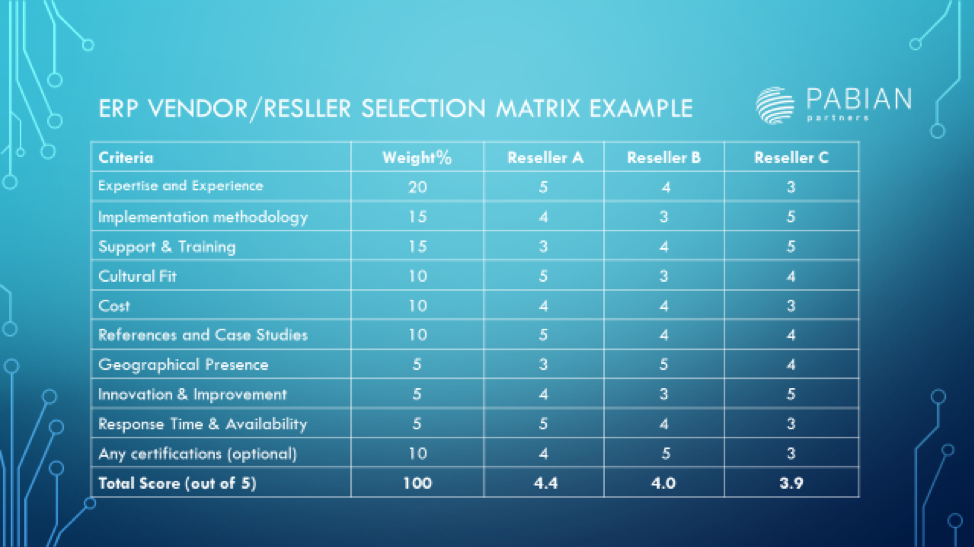A Comprehensive Guide to ERP Vendor Selection

Introduction
Selecting the right Enterprise Resource Planning (ERP) vendor is a critical decision for all businesses. An ERP system can streamline operations, improve efficiency, and drive growth, but choosing the wrong vendor can lead to costly delays and implementation challenges and could be one of the main reasons why ERP implementations fail. With the right vendor partner, you can leverage ERP technology to streamline processes, improve efficiency, and drive business growth for years to come.
In this comprehensive guide, we’ll explore the key criteria for you to consider when selecting an ERP vendor to ensure a successful implementation and long-term success.
Key Criteria and Best Practices for ERP Vendor Selection:
1. Define Your Business Requirements:
Before diving into the vendor selection process, you must first define your business requirements and objectives for an ERP system. Identify the specific functionalities and modules needed to support your business processes, such as accounting, inventory management, sales, and CRM. Consider factors like scalability, industry-specific features, and compliance requirements that are essential for your business operations.
2. Define Vendor Selection Criteria
Start by identifying the key criteria that are important for your business when evaluating ERP vendors and resellers. Common criteria may include geographical presence, system functionality, vendor experience, cost, support services, scalability, and user-friendliness, cultural fit. Ensure that the criteria are specific, measurable, relevant, and aligned with your business objectives and requirements.
3. Assess Vendor Experience and Expertise:
When evaluating ERP vendors, consider their experience and expertise in serving your niche. Look for vendors with a proven track record of successfully implementing ERP solutions for businesses similar in size and industry to yours. Research the vendor’s reputation, customer references, and case studies to gauge their ability to meet your needs and deliver results even if it means having an on-site demo and meeting with their team in person. Most importantly, an ERP vendor should be able to provide an unbiased opinion on whether the system will work for you or not and which features will be useful instead of selling all of them which may or may not make sense for you at this time. Also, they should be able to maintain open communication and be responsive to your team members throughout the discovery phase.
4. Evaluate System Flexibility and Customization:
Every company has unique business processes and requirements, so it’s essential to choose an ERP system that offers flexibility and customization options. Evaluate the vendor’s ERP platform to ensure it can be tailored to your specific needs without excessive complexity or cost. Look for features like configurable workflows, customizable dashboards, and the ability to add or modify modules as your business grows.
5. Consider Deployment Options:
ERP systems can be deployed on-premises, in the cloud, or through a hybrid approach, each offering its own benefits and considerations. Consider your organization’s IT infrastructure, budget, and scalability needs when choosing a deployment option. Cloud-based ERP solutions are increasingly popular among SMBs for their affordability, scalability, and ease of implementation, but on-premises solutions may offer greater control and security for some businesses.
6. Assess Total Cost of Ownership (TCO):
When evaluating ERP vendors, consider the total cost of ownership (TCO) beyond just the initial implementation costs. Factor in ongoing expenses such as software licensing, maintenance and support fees, training, and potential customization or integration costs. Compare pricing models, subscription plans, and hidden fees across different vendors to ensure you’re getting the best value for your investment over the long term.
7. Review Vendor Support and Training:
Adequate support and training are essential for a successful ERP implementation and user adoption. Evaluate the vendor’s customer support offerings, including response times, availability, and escalation procedures. Inquire about training programs, documentation, and resources available to help your team get up to speed with the new ERP system. Look for vendors that offer comprehensive support and training tailored to your needs.
8. Investigate Data Security and Compliance:
Data security is a top priority for SMBs, especially when storing sensitive business information in an ERP system. Evaluate the vendor’s data security measures, including encryption, access controls, and disaster recovery capabilities, to ensure your data remains safe and protected. Additionally, consider any industry-specific compliance requirements, such as HIPAA or GDPR, and ensure the ERP system meets these standards.
9. Seek Vendor Stability and Long-Term Viability:
Choose an ERP vendor with a stable team and a long-term commitment to supporting their product and customers. Research the ERP’s and reseller’s/vendor’s financial stability, revenue growth, and market presence to assess their viability as a long-term partner. Consider factors like product roadmap, software updates, and ongoing innovation to ensure the ERP system will continue to meet your needs and evolve with your business over time.
Questions You Should Ask Potential ERP Vendors to Evaluate Them
1. Understanding Vendor Experience and Expertise:
- How long have you been in business, and how many ERP implementations have you completed?
-
- Can you provide examples of ERP projects you’ve successfully completed for businesses similar to ours?
-
- Which industries do you specialize in, and do you have experience with businesses in our industry?
-
- What is your approach to implementation, including project management methodologies?
2. Assessing System Functionality and Fit:
- Can you provide an overview of the ERP’s core functionalities and modules?
- How customizable is the ERP system, and can it accommodate our unique business processes and requirements?
-
- What are the pros and cons of implementing features and functionality A, B & C?
-
- Do you offer industry-specific features or compliance capabilities that are relevant to our business?
3. Deployment Options and Scalability:
- What deployment options do you offer for your ERP solution (cloud-based, on-premises, hybrid)?
-
- How easily can the ERP system scale to accommodate our business growth and changing needs?
-
- Can you provide examples of companies that have successfully scaled their ERP systems with your solution?
4. Understanding Total Cost of Ownership (TCO):
- What are the upfront costs associated with implementing the ERP solution (licensing, implementation, customization)?
-
- What ongoing costs should we expect, including maintenance, support, and upgrades?
-
- Are there any hidden fees or additional expenses we should be aware of?
5. Support and Training Services:
- What level of customer support do you provide, how quickly can you resolve our issues and how can we contact support if issues arise?
-
- Do you establish clear SLAs with your clients that outline response times, resolution procedures and escalation paths for support issues?
-
- Do we get a dedicated Account Manager as a primary point of contact and ongoing communication?
-
- Do you offer training programs or resources to help our team get up to speed with the ERP system?
-
- What documentation and user guides are available to assist with system usage and troubleshooting?
6. Data Security and Compliance:
- How do you ensure the security and confidentiality of our data within the ERP system?
-
- What measures do you have in place to protect against data breaches and cyber threats?
-
- Does the ERP solution comply with industry-specific regulations and standards (e.g., GDPR, HIPAA)?
7. Vendor Stability and Roadmap:
- How big is your team and what are their qualifications?
-
- Can you provide insights into your product roadmap and plans for future enhancements or updates?
-
- How do you plan to support our business in the long term as our needs evolve and grow?
8. Client References and Case Studies:
- Can you provide references from other clients on our space whom you have helped implemented an ERP solution?
-
- Do you have any case studies or success stories that demonstrate the benefits and ROI of the ERP system?
-
- How do your existing clients rate their satisfaction with your ERP solution and services?
By asking these questions during the discovery process, you can gain valuable insights into the vendor’s capabilities, solution fit, and commitment to supporting your business’s ERP needs effectively.
Once you have your notes about all ERP vendors and resellers you have evaluated, create an effective vendor evaluation matrix. We will talk about it in detail below.
How to Create an Effective ERP Vendor Evaluation Matrix?
Once you have defined the selection criteria as discussed above, it’s time to assign numbers or scores to evaluate which vendors qualify your selection criteria. This type of matrix will also work for an ERP selection in case you haven’t selected your ERP yet.
Take a look at the below matrix example:

1. Assign Weights
Assign weights to each criterion to indicate its relative importance in the vendor selection process. Weights can be expressed as percentages or numerical values based on the significance of each criterion to your business. For instance, if expertise and experience are your top priority, you might assign it a higher percentage or value.
2. Define Scoring Metrics
Establish a scoring system, such as 1 to 5 or 1 to 10, where each number corresponds to a specific level of satisfaction or achievement (e.g., 1 = Poor, 5 = Excellent).
3. Collect Data
Gather information on each potential partner based on your criteria. This might involve sending out RFPs (Requests for Proposal), conducting interviews, or requesting demonstrations and client references.
4. Score Each Partner
Evaluate each potential partner against your criteria using the scoring metrics. Fill in the scores for each criterion for every partner.
5. Calculate Weighted Scores
Multiply each score by the corresponding criterion’s weight, then sum these to get a total weighted score for each partner. This weighted average method ensures that the criteria deemed more critical to your organization have a more significant impact on the final score, giving you a nuanced and tailored assessment of each potential partner’s suitability for your ERP implementation project.
6. Analyze and Decide
Review the total scores alongside the qualitative insights gathered during your evaluation. Consider any deal-breakers or must-haves that may not be fully captured by the scoring system.
7. Final Decision
Based on the total weighted scores and your qualitative assessments, make an informed decision on the best ERP reseller and implementation partner for your business needs along with your team.
Remember, the matrix is a tool to aid decision-making but should be used alongside discussions, demonstrations, and reference checks to ensure the chosen partner is the best fit for your organization’s specific requirements and culture. You’ll see that most businesses don’t really use a matrix but understand this will help you to make a case to your C or VP level stakeholders if you have a visual representation of why you are choosing who you are choosing for your ERP implementation project.

